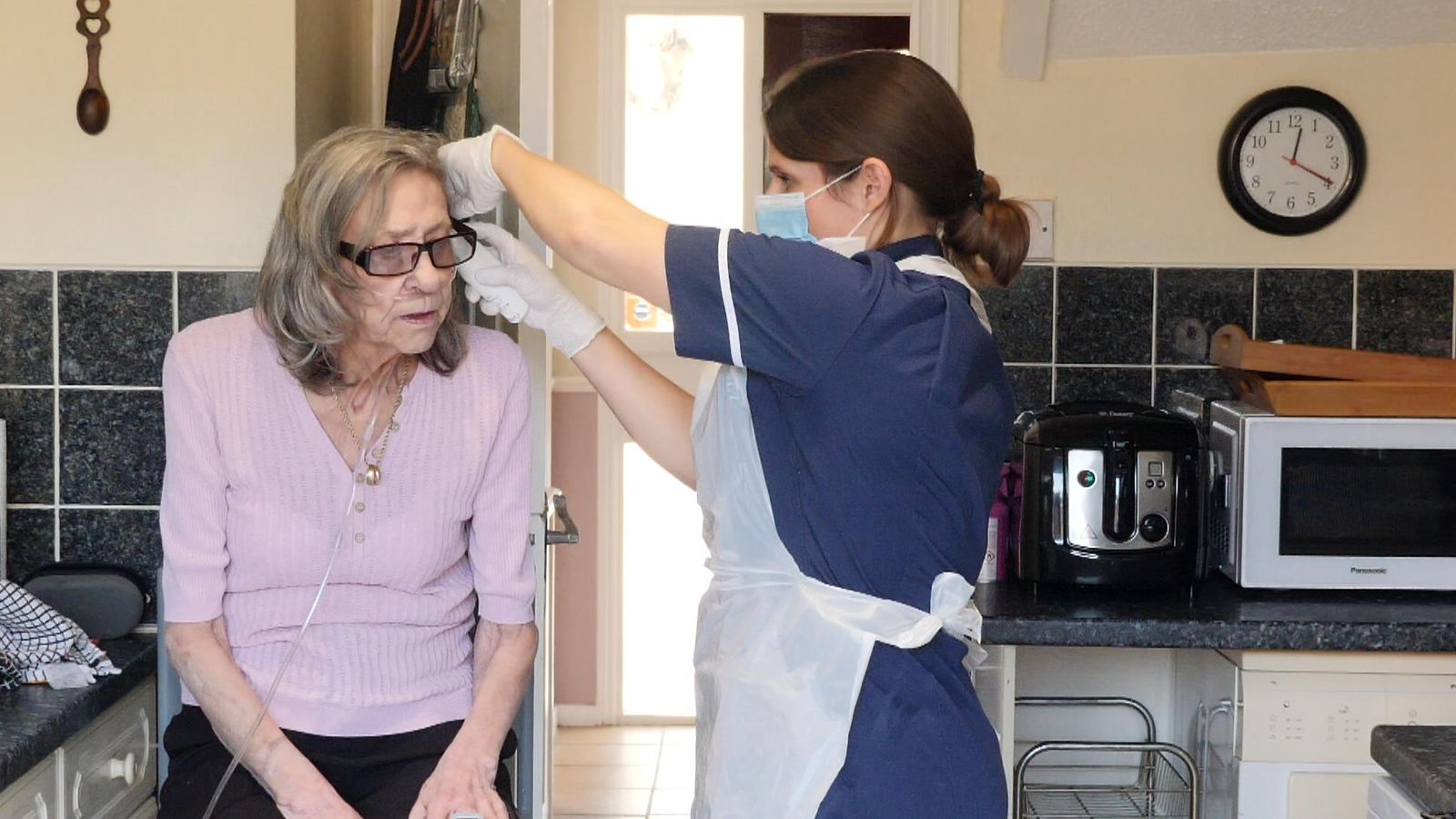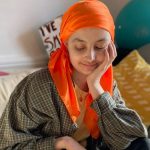Community nurses have told Sky News for them the pandemic is just beginning – as they gear up to deal with increased caseloads in the home.
Community nurses in southeast London say they are seeing a steep rise in the number of patients with complex health needs as a direct and indirect result of the pandemic.
The positive impact of the country’s vaccination programme on COVID-19 can be seen in the huge reduction of seriously sick patients who need urgent hospital care.
But now, as pressures on hospitals begins to ease, pressure on community nursing teams begins to increase.
Patients with long COVID will need to be cared for – and many of these will need looking after in their own homes by community nurses.
Teams working in the Oxleas NHS Foundation Trust are already reporting an increase in referrals for patients who need respiratory, occupational therapy and diabetes support while still managing existing pre-pandemic caseloads.
Harriet Webster, a specialist respiratory nurse, told Sky News ways of managing increasing case loads will need to be found.
She said: “I think we’ve even seen an increase in referrals into our services over the past few months and year. I think we have actually got to look at ways of managing that.
“Community sites are really good at looking after patients and managing their expectations but I think in the long term, services are going to have to grow to cope with the demand.”
Pam Bass is one of Ms Webster’s existing patients. She has COPD – a chronic lung condition – and needed oxygen support before COVID.
Mrs Bass suffered a stroke on Boxing Day. Very soon afterwards both she and her husband Ron became infected with coronavirus.
They travelled to hospital in the same ambulance and lay next to each other in the same ward. Eventually she came home. Ron did not.
“He was lovely,” Mrs Bass said. “I knew him when I was 14. All told, I knew him 65 years. He was a brilliant dad.”
For some housebound patients, community nurses are the only contact they have with the outside world.
For Pam, Harriet is more than a community nurse. She is friend, physician, therapist and much more.
She describes Harriet as “brilliant” and said: “I can ring if I want to. If I have a problem then I just ring her.”
The pandemic means there are many more patients like Pam who will need nurses like Harriet.
Referrals in her patch in Bexley, southeast London, already up 10% on the previous year.
And this will be the same for health trusts across the country. It adds to the pressure as they try to restore services to pre-pandemic levels.
Laura Oyewole, team manager for heart failure and cardiac rehabilitation, put it quite starkly.
She said: “The pandemic is not over for us in the community. Actually it has just begun because we are picking up on a lot of issues patients have.”
Her colleague Natalie Black agrees.
As a lead neuro occupational therapist, she spent the pandemic supporting her colleagues in intensive care.
Now she has returned to an increased workload in the community.
She said: “We already have people waiting to be seen, and on top of that, we are dealing with a population of people who have become unwell at home – and we are trying to keep them well and at home.
“We are also having to deal with really complex cases coming out of hospital.
“What this means for us is that we now have a caseload of patients, who should be on inpatient wards, but actually they are out in the community.”
The role of community nursing teams will become even more crucial in a health service emerging from the worst crisis in its history.
Not only will they have to treat more patients at home but essentially they must try to stop these patients from being readmitted to hospital.
Mrs Black added: “For us the journey has just begun, to be honest with you.
“We’ve been in a state of crisis as a community team trying to support our acute colleagues.
“Lots of our staff were redeployed to go in and even support just turning patients in bed to start with.
“But at the same time, we’ve been working really hard to stop people going into hospital as well…. whilst also trying to facilitate getting people out of hospital.
“That’s had a huge impact. We already have people waiting to be seen.”
One of the unforeseen consequences of COVID treatment with steroids is the resulting increase in diabetes.
Pippa Ashford is a diabetes specialist nurse for the same area.
She says she has seen a “massive increase in my referral rate for people who have had COVID”.
She added: “The treatment pathway with high dose dexamethasone steroids is inducing diabetes in some people.
“The link between steroids and diabetes is already well known, but it has taken us by surprise – the sheer volume of steroid-induced diabetes that we have been seeing.”
Speciality community nurses are the often unseen workforce delivering care behind closed doors.
That role in a post-pandemic world will be more essential than ever before.






















